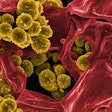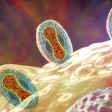Dear LabPulse Member,
LabPulse.com has been officially up and running for almost one year now, and we've been enjoying our interactions with our membership base as the site has grown. We are happy to introduce Case Study, a new section of the site that offers an interactive pathology case study.
Each case study will include the clinical history of a patient, images, questions about the appropriate diagnosis, and references. Our first case study describes a woman in her 60s presenting with a monthlong history of altered mental status. Can you get the diagnosis correct on your first try?
We want to build Case Study into a comprehensive library of interesting pathology cases and are looking for new submissions. Please get in touch with us at [email protected] if you would like to share an interesting case.
Our communities are another unique feature of LabPulse: They are designed to provide highly focused information and collaborative opportunities for laboratory medicine professionals. LabPulse.com has 11 different communities, each allowing a deeper dive into a specific area of interest, such as oncology, point-of-care testing, lab economics, and microbiology.
The Microbiology Community is one of our most active areas due to coverage of the 2019 novel coronavirus global public health threat. Our most-read stories over the past two weeks have been about the novel coronavirus, now called SARS-CoV-2, and the respiratory disease it causes, dubbed COVID-19. In the U.S., the Centers for Disease Control and Prevention distributed test kits to qualified laboratories. But the agency reported problems with some of the test kits and noted that, amid the crisis, it is moving as fast as possible but also has to ensure quality control.
Other recent stories on the coronavirus outbreak include the following:
- Coronavirus test gets CMS billing code
- Coronavirus toll surges after sanction of CT diagnosis
- CT imaging supplements lab tests for diagnosing coronavirus disease
Immunology/microbiology is the second largest segment of the global market for clinical laboratory services, after clinical chemistry (routine and essential testing), according to a new report from LabPulse.com sister company Kalorama Information. Kalorama publisher Bruce Carlson shared some highlights from the report in an article we published today. It is estimated that 70% to 80% of diagnoses by physicians result from laboratory tests, and clinical laboratory services are involved in 100% of patient care plans in oncology indications, Kalorama noted.
Finally, in a recent report in JAMA Oncology, experts highlighted the increasing importance of genetic testing in patients newly diagnosed with pancreatic cancer. Regardless of the risk profile, the core genes to test for in an initial screening include BRCA1, BRCA2, and PALB2; rare but important genes should be added if needed based on clinical features, the authors advised.



















